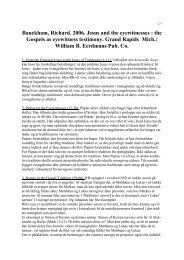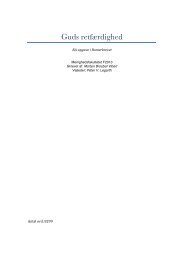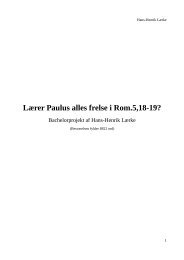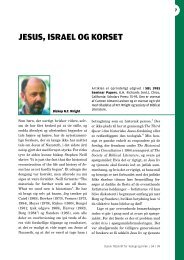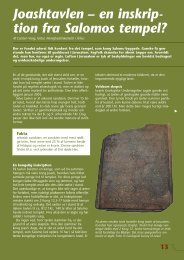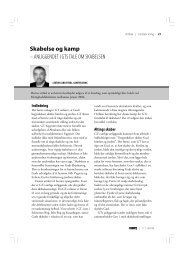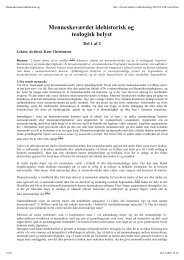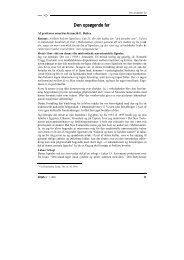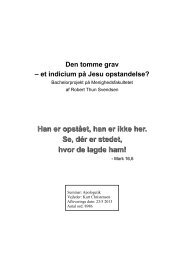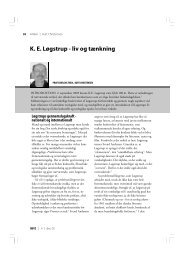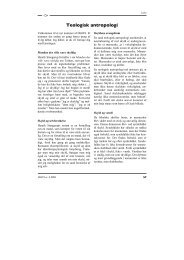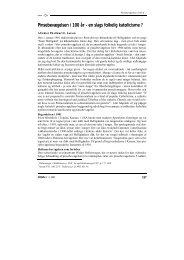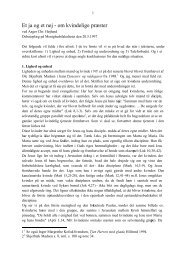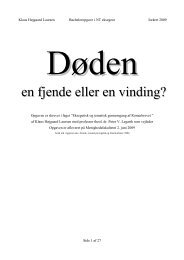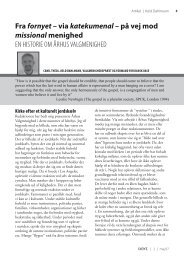Indholdsfortegnelse
Indholdsfortegnelse
Indholdsfortegnelse
Create successful ePaper yourself
Turn your PDF publications into a flip-book with our unique Google optimized e-Paper software.
Sammenfatning og konklusion 191<br />
of examination and pointed to the narrative as a self-contained category in the Biblical text<br />
material.<br />
Frei’s considerations on method in the work The Identity of Jesus Christ is then examined.<br />
In this book Frei seeks to throw light on the identity of Jesus Christ by answering the questions:<br />
"What is he like?" and "Who is he?". Both identity and narrative imply an interaction<br />
between events and character, and in the examination of both he insists on proceeding as formally<br />
as possible, so that the examination will not seize control over the examined and thus<br />
determinate its own result.<br />
The text concept itself is the theme of a passage which raises four points of consideration:<br />
meaning, reference, history and historical correctness and finally truth. The text itself forms<br />
its own meaning, and the aim of a reading of the text is the text itself and its inherent meaning.<br />
Frei maintains a trust in the possibility of establishing the meaning of the text, its sensus<br />
literalis, firstly from the text itself and later from the interpretation context of the text. He<br />
moves from an actual linguistic work on texts to an interpretation - inspired by sociology - of<br />
practise. The text reference is not ostensive but is a creating process, but thereby the relationship<br />
between report and factual reality becomes indistinct.<br />
In Types of Theology Frei puts forward a typology of theologies which handles the relationship<br />
between theology and philosophy from the leading question: Is theology a part of<br />
philosophy or an aspect of Christianity? From among theologians, embracing Em. Kant representing<br />
the first viewpoint to D. Z. Phillips rejecting any philosophical interference in theology,<br />
Frei chooses K. Barth as the person, whose theology best supports and matches a "literal"<br />
reading of the Bible’s realistic narratives. Frei sharply refuses to let any philosophy form<br />
the basis for theology, but at the same time he acknowledges that theology as thought will<br />
always involve philosophy.<br />
Frei’s thinking is a challenge for theology, partly because he throws new light on the text,<br />
partly because, at all levels also that of theory of science, he insists on the particular. However<br />
the question of reference and the relationship between text and factuality remains too<br />
muddled. A decisive weakness in addition is made up by the postponement and failing examination<br />
of the problem of truth.<br />
Ch. 3 Debate Between Paul Ricoeur and Hans W. Frei. In this chapter the debate between<br />
Ricoeur and Frei on narrative theology is examined. Ricoeur views narrative theology<br />
as a necessity in order to emphasise the narrative as an independent category in the biblical<br />
scriptures. It profits from resources in narratology but is rendered difficult by the indispensability<br />
of a systematising work on the narratives. Frei considers narrative theology an acknowledgement<br />
and a practical study of biblical texts as narratives, not a assertion of the narrative<br />
as a ontological trait. Frei has catalysed a debate in K. J. Vanhoozer’s and B. K. Ug-



